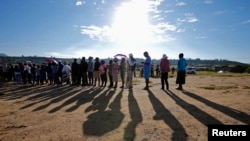Vote counting is under way in Lesotho, the tiny African enclave surrounded by South Africa, where voters cast ballots for a new National Assembly and prime minister in snap elections.
Saturday's election, two years earlier than scheduled, followed an attempted coup in August that forced Prime Minister Thomas Thabane to flee. The attempt took place after Thabane sought to replace the army’s top commander, said to be an ally of Deputy Prime Minister Mothetjoa Metsing.
Thabane is now back at home in the capital, Maseru, hoping to return to office after votes are counted. But he told VOA on Saturday, while appearing in his home district of Abia, that he still feared for his life.
Thabane was flanked by heavily armed security guards, and sniffer dogs swept the area before he voted.
Three parties were jostling for control of the government: Thabane's All Basotho Convention, the main opposition Democratic Congress and the Lesotho Congress for Democracy.
Thabane has presided over a tripartite coalition government, the first of its kind in the country's history. However, discord within the coalition built rapidly when Thabane declared a 10-month suspension of parliament in June. The declaration came after the opposition tried to pass a motion of no-confidence that would have ousted the prime minister.
In an interview with VOA in Maseru, Thabane said he closed parliament because "there was definitely a conspiracy to have a regime change within parliament. ... I could have hung on and struggled on, but I thought, 'Let's go back to the people.' So I have risked my own position. I still had some time as prime minister."
Metsing, also running for the prime minister position, told VOA it was a mistake for his LCD party to have entered into a coalition government with Thabane's ABC.
Metsing said that "we differed with ABC on so many issues. ... Today, we are aware that we made mistakes." He said now his party "would like to ensure that we can grow the economy. We would address aggressively the issue of youth unemployment, because I think that it is a time bomb waiting to explode."
Former Prime Minister Pakalitha Mosisili of the main opposition Democratic Congress was also running for the country's top post against Thabane and Metsing.
The Southern African Development Community brokered an agreement with Lesotho's coalition parties to end the suspension of parliament in order to hold the snap election.
In Abia district, people wearing bobble hats and wrapped in woolen blankets for protection against the morning chill cast their votes in canvas tents pitched in a field.
Thabane was in high spirits when he voted. “My opponents will never praise me, and I am not going to praise them myself — that’s politics," he said. "You don’t praise your enemy in politics, you pull him down and you pull off his pants so women can laugh at him, so tighten your belt if you are in politics. Here in politics, we do unto others as they do unto us.”
Thabane dismissed accusations from opposition parties that he had stuffed government institutions with his supporters to assert his power.
Voting in Abia, Winned Magala said she voted for Mosisili, who was prime minister from 1998 to 2012. Years at the helm of government have given him an advantage, she said.
“ I think the order of DC is coming to do something better than Thabane,” she said.
With no opinion polls in Lesotho, it was difficult to predict the election outcome, but some said that the Democratic Congress was a strong contender. The party won a significant number of seats in the 2012 election but fell short of winning a majority, losing out to the ABC-led coalition.
The top finishers most likely will have to look for allies to form a coalition government.
Some voters said they felt the politicians hadn't done enough for Lesotho, where nearly 60 percent of the 2 million population lives below the poverty line.
“According to me, I don’t see anything that can be different because here they are still the same people, same people," said Rethabile Bohope, 23, who is unemployed. "If this one goes down, this one comes up, there’s no difference. They will look for themselves and their own benefits.”




